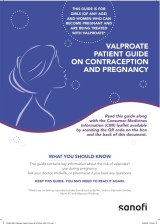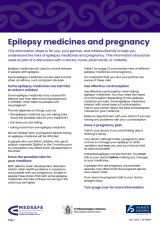You can now add Healthify as a preferred source on Google. Click here to see us when you search Google.
Epilim®
Also known as sodium valproate
Key points about Epilim
- Epilim is used to treat epilepsy by preventing seizures and is also used to control some mood disorders such as bipolar disorder.
- Epilim can seriously harm your unborn baby. People of all genders who are taking Epilim must use reliable contraception to prevent pregnancy.
- Epilim is also called sodium valproate.

Epilim is used to treat epilepsy by preventing seizures and is also used to control some mood disorders such as bipolar disorder. It's sometimes used to prevent migraine headaches.
Epilim is not recommended if there's a chance that you could become pregnant or father a child. If taken during pregnancy, Epilim can harm a baby's development, causing birth defects and lifelong learning difficulties.
Everyone taking Epilim must use effective contraception to avoid pregnancy.
- If you're taking Epilim, you must use reliable contraception, even if you're not currently sexually active. Read more about epilepsy and contraception.
- Men who could father children should use contraception while taking Epilim and for at least 3 months after stopping.
- If you're planning a pregnancy, talk your healthcare provider 6 to 12 months in advance so you can make a plan and discuss the best options.
If you're pregnant or think you might be pregnant, keep taking your medicine at the right dose, and contact your healthcare provider straight away – tell them you think you're pregnant and make an urgent appointment to see them.
Note: The information on this page is for adults taking Epilim. For information on how to give Epilim to children, see sodium valproate information for parents and carers(external link).
In Aotearoa New Zealand, Epilim is available as:
-
- Epilim 100 mg tablets (white coloured tablets).
- Epilim EC (enteric-coated) tablets in 2 strengths: 200 mg or 500 mg tablets (lilac-coloured tablets).
- Epilim liquid 200 mg in 5 mL.
- Always take your Epilim exactly as your healthcare provider has told you. The pharmacy label on your medicine will tell you how much to take, how often to take it and any special instructions.
- The dose of Epilim will be different for different people.
- Your healthcare provider will start you on a low dose and increase your dose slowly over a few weeks.
- Epilim is usually taken 2 or 3 times a day.
- Food: Epilim is best taken with food to prevent stomach upset.
- Timing: Take your doses at the same times each day, to help you to remember to take it.
- Missed dose: If you forget to take your dose, take it as soon as you remember. But, if it's nearly time for your next dose, just take the next dose at the usual time. Don't take double the dose.
- Keep taking Epilim every day: Don't stop taking Epilim suddenly; talk to your healthcare provider before stopping because it can cause seizures if you stop taking it suddenly.
Epilim EC tablets (lilac tablets)
- Take these tablets with a glass of water.
- These are called enteric-coated (EC) tablets. The coating prevents the medicine from upsetting your stomach.
- Don't crush or chew them, as this will destroy the coating and be more likely to cause side effects.
Epilim tablets (white tablets)
- Swallow the tablets with a glass of water.
- If you have problems swallowing the tablets, you can crush the tablets and mix with a small amount of soft food such as yoghurt or a small drink. Swallow the food or drink straight away.
Epilim liquid
- Shake the bottle well and measure the right amount using an oral syringe or medicine spoon. You can buy these from your pharmacy.
- Don't use a kitchen spoon as it won't give you the right amount.
Here are some things to know when you're taking Epilim. Other things may be important as well, so ask your healthcare provider what you should know about.
Use reliable contraception while you're taking Epilim
Epilim is not recommended if there's a chance that you could become pregnant or father a child. If you're taking Epilim, you must use reliable contraception, even if you're not currently sexually active.
- Reliable contraception means using methods that have a very low chance of pregnancy, such as an intrauterine device (IUD) or the progestogen-only implant. Fewer than 1 in every 100 people who use them become pregnant during 1 year of typical use.
- Less reliable contraception includes Depo Provera injection, the combined oral contraceptive pill or the progestogen-only pill. Extra protection like condoms or not having sex is needed with these methods. You should also think about switching to a more reliable way to prevent pregnancy.
- Unreliable contraception includes using condoms, withdrawal, or fertility awareness. These aren't recommended as your main form of contraception because they're more likely to fail. Read more about epilepsy and contraception.
Taking other medicines
Epilim interacts with some medicines including those you can buy over the counter, herbal supplements and rongoā Māori, so check with your healthcare provider or pharmacist before starting Epilim, or before starting any new medicines.
Indigestion medicines: If you're taking the enteric-coated (EC) tablets, don't take indigestion medication (antacids) or iron supplements within 2 hours of taking Epilim.
If you're driving, cycling or operating machinery
Epilim can make you feel drowsy, dizzy or light-headed especially when you first start taking it. Don't drive, cycle or operate machinery until you know how this medicine affects you. See driving and medicines.
Tests and monitoring
While you're taking Epilim, you'll need blood tests to monitor for side effects and to check whether the treatment is working. Blood tests are very important during the first few months of treatment. Over time, these tests are needed less often.
Before having surgery or a medical procedure
Tell your healthcare provider you're taking Epilim before you have surgery or a medical or dental procedure. Taking Epilim may make you bleed or bruise more.
Like all medicines, Epilim can cause side effects, although not everyone gets them. If you're concerned about any symptoms you think might be related to your medicine, talk to your healthcare provider. The following information offers some guidance but doesn't include all possible side effects.
Common side effects
Tell your healthcare provider if these side effects bother you.
- Feeling sick (nausea), stomach upset: Take Epilim with food.
- Feeling sleepy, drowsy, dizzy, or faint: Be careful when you're driving or using tools until you know how this medicine affects you. Limit or avoid alcohol as this can make these side effects worse. Read more epilepsy/seizures and driving(external link).
- Weight gain.
- Hair loss.
- Headache.
- Mouth ulcers or problems with your gums.
- Pain when menstruating (periods).
Tell your healthcare provider immediately or phone Healthline free on 0800 611 116 if these occur
- Changes in mood, personality or behaviour or low mood, suicidal thoughts (thoughts of harming yourself).
- Signs of problems with your liver, eg, severe tummy pain, yellowing of the eyes and skin, dark urine.
- Signs of changes in blood cells, eg, bruising easily, feeling tired, looking pale, getting sick often.
Phone 111 for an ambulance or go to your nearest accident and emergency (A&E) clinic if these occur
- Signs of an allergic reaction such as itchy skin, and rash, swollen lips or tongue, problems breathing, like a tight chest or shortness of breath.
Read more about medicines and side effects and reporting a reaction you think might be a side effect.
The following links provide further information on sodium valproate:
Epilim(external link) Medsafe Consumer Information Sheet, NZ
For adults: sodium valproate(external link) New Zealand Formulary Patient Information
For children: sodium valproate(external link) New Zealand Formulary for Children
Medicines for epilepsy, mental health and pain can harm your unborn baby(external link) ACC, NZ, 2020
Brochures
Valproate Patient Guide on contraception and pregnancy(external link) Sanofi, Australia, 2025
Epilepsy medicines and pregnancy(external link) Medsafe, NZ, 2025
Valproate guide for men of reproductive potential [PDF, 210 KB] Sanofi, Australia, 2023
Sodium valproate for preventing seizures - Medicines for Children(external link) NZ Formulary for Children, 2013
5 questions to ask about your medications(external link) Health Quality and Safety Commission, NZ, 2019 English(external link), te reo Māori(external link)
References
- Sodium valproate(external link) New Zealand Formulary Patient Information
- Sodium valproate(external link) New Zealand Formulary for Children
- Sodium valproate (Epilim) use in people who can father children – important new safety information(external link) Medsafe, NZ, 2023
- Valproate guide for healthcare professionals who manage girls, women of childbearing potential and men treated with valproate(external link) Sanofi, Australia, 2023.
- Individuals of reproductive potential and pregnancy(external link) NZ Formulary
Brochures

Valproate Patient Guide on contraception and pregnancy
Sanofi, Australia, 2025

Epilepsy medicines and pregnancy
Medsafe, NZ, 2025

Valproate guide for men of reproductive potential
Sanofi, Australia, 2023
Credits: Healthify editorial team. Healthify is brought to you by Health Navigator Charitable Trust.
Reviewed by: Angela Lambie, Pharmacist, Auckland
Last reviewed:





